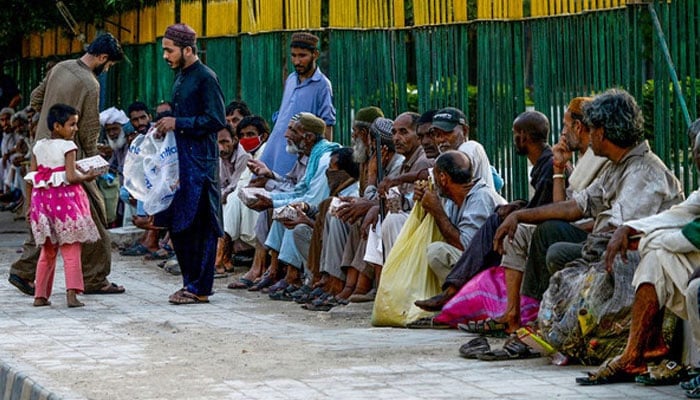What leads to poverty
LAHORE: Addressing the complex issue of poverty in Pakistan requires a multifaceted approach encompassing education, healthcare, infrastructure, governance and financial inclusion.
Limited access to quality education hinders an individual’s ability to acquire skills needed for better-paying jobs. More than three million children of school-going age (all poor) prove this fact
High unemployment rates and a lack of sufficient job opportunities force many into low-paying, unstable employment. What the poor earn from low-paying jobs is not enough to even feed their families. Poor healthcare services and high medical costs that drain families’ resources push many families deeper into poverty.
Insufficient infrastructure, including clean water, sanitation, and electricity, hampers economic growth and quality of life. Ongoing political instability and conflicts that disrupt economic activities and scare away potential investment is another factor in this regard. Economic, social, and gender inequalities limit access to opportunities and resources for large segments of the population.
Many Pakistanis rely on agriculture, which is vulnerable to climate change, natural disasters, and market fluctuations. Families having extremely small landholding remain glued to agriculture but cannot earn enough to live a respectable life. Inflation and the high cost of living have badly hurt the lower strata of society. Most families that once lived just above the poverty line have now slipped down the poor line. The rising prices of basic goods and services reduce the purchasing power of the poor.
The poor badly need financial inclusion that involves providing individuals and businesses with access to useful and affordable financial products and services -- transactions, payments, savings, credit, and insurance -- that are delivered in a responsible and sustainable way. The affluent segment of society is mostly given financial facilities but the lower strata including cottage and small industries, rural communities and women are denied financial facilitation.
The fastest way to achieve financial inclusion include mobile banking and fintech solutions. Although mobile phone subscribers in Pakistan exceed 190 million, the lack of digital knowledge impedes many subscribers from benefiting from the financial services provided by many mobile phone operators. Fintech serves established businesses and the middle class that already operate normal bank accounts. Utilizing mobile banking and fintech can rapidly expand access to financial services, especially in remote and underserved areas.
Implementing supportive government policies and regulatory frameworks can encourage the expansion of financial services. Educating the population on financial products and services empowers them to make informed decisions. between the government, financial institutions, and the private sector can drive financial inclusion initiatives. Establishing digital IDs can facilitate easier access to financial services by verifying individuals’ identities.
The impact of corruption on the poor cannot be ignored as it results in the misallocation of public resources, which could have been used for development projects benefiting the poor. Corruption increases the cost of doing business, discouraging investments and economic activities that could generate employment. , corruption results in poor-quality public services, including education, healthcare, and infrastructure, which are crucial for poverty reduction.
Corrupt practices undermine good governance, leading to the ineffective implementation of policies and programmes designed to alleviate poverty. Corruption often benefits the wealthy and well-connected, exacerbating income inequality and limiting opportunities for the poor.
-
 What You Need To Know About Ischemic Stroke
What You Need To Know About Ischemic Stroke -
 Shocking Reason Behind Type 2 Diabetes Revealed By Scientists
Shocking Reason Behind Type 2 Diabetes Revealed By Scientists -
 SpaceX Cleared For NASA Crew-12 Launch After Falcon 9 Review
SpaceX Cleared For NASA Crew-12 Launch After Falcon 9 Review -
 Meghan Markle Gives Old Hollywood Vibes In New Photos At Glitzy Event
Meghan Markle Gives Old Hollywood Vibes In New Photos At Glitzy Event -
 Simple 'finger Test' Unveils Lung Cancer Diagnosis
Simple 'finger Test' Unveils Lung Cancer Diagnosis -
 Groundbreaking Treatment For Sepsis Emerges In New Study
Groundbreaking Treatment For Sepsis Emerges In New Study -
 Roblox Blocked In Egypt Sparks Debate Over Child Safety And Digital Access
Roblox Blocked In Egypt Sparks Debate Over Child Safety And Digital Access -
 Savannah Guthrie Addresses Ransom Demands Made By Her Mother Nancy's Kidnappers
Savannah Guthrie Addresses Ransom Demands Made By Her Mother Nancy's Kidnappers -
 OpenAI Reportedly Working On AI-powered Earbuds As First Hardware Product
OpenAI Reportedly Working On AI-powered Earbuds As First Hardware Product -
 Andrew, Sarah Ferguson Refuse King Charles Request: 'Raising Eyebrows Inside Palace'
Andrew, Sarah Ferguson Refuse King Charles Request: 'Raising Eyebrows Inside Palace' -
 Adam Sandler Reveals How Tom Cruise Introduced Him To Paul Thomas Anderson
Adam Sandler Reveals How Tom Cruise Introduced Him To Paul Thomas Anderson -
 Washington Post CEO William Lewis Resigns After Sweeping Layoffs
Washington Post CEO William Lewis Resigns After Sweeping Layoffs -
 North Korea To Hold 9th Workers’ Party Congress In Late February
North Korea To Hold 9th Workers’ Party Congress In Late February -
 All You Need To Know Guide To Rosacea
All You Need To Know Guide To Rosacea -
 Princess Diana's Brother 'handed Over' Althorp House To Marion And Her Family
Princess Diana's Brother 'handed Over' Althorp House To Marion And Her Family -
 Trump Mobile T1 Phone Resurfaces With New Specs, Higher Price
Trump Mobile T1 Phone Resurfaces With New Specs, Higher Price




